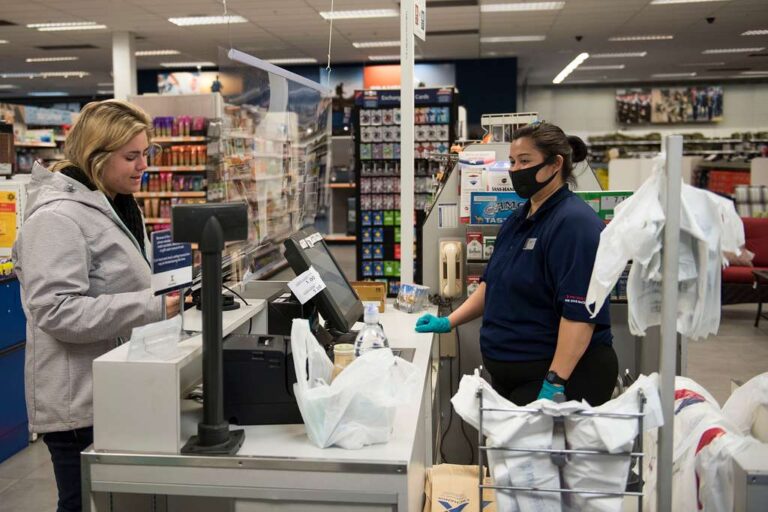
Courtney Brunson is a student at Harvard Law School and member of the Harvard Legal Aid Bureau.
Now that the Democratic Party has a majority in both chambers of Congress, elected officials and progressive groups alike have been pushing for policy issues that improve the wellbeing of workers, including a living wage and basic employment benefits. According to Axios, House Committee on Education and Labor Chair Bobby Scott (D-Va.) and Senate Budget Chairman Bernie Sanders (I-Vt.) led a group of Democrats yesterday in sponsoring a bill to increase the federal minimum wage to $15 per hour over five years. Though the House passed a similar bill in 2019 that was subsequently blocked by former Senate Majority Leader Mitch McConnell, these members are hoping that their majority and a Biden-led White House will lead the bill’s success.
Market Watch reported that 75 labor advocacy organizations, including the National Employment Law Project, the AFL-CIO, Color of Change, and Gig Workers Rising, wrote to U.S. Senate and House leaders yesterday asking that the Congress not pass legislation that allows gig economy companies to deny their workers basic workplace protections and benefits by classifying them as independent contractors. In the letter, the groups specifically referred to Uber and Lyft’s successful lobbying efforts in California to pass Proposition 22, which exempted them from having to classify their workers as employees as outlined in the ABC requirements within the state’s Assembly Bill 5 law. As a reminder, a worker’s classification as an independent contractor, as opposed to an employee, prevents them from receiving benefits like guaranteed minimum wage, paid family leave, paid sick leave, overtime pay, and state disability and unemployment insurance.
As the risks associated with working during the COVID-19 pandemic continues, Bloomberg wrote about Virginia’s enactment of a permanent rule that requires employers to abide by recommendations and mandates by the Commonwealth’s Department of Health and the Centers for Disease Control and Prevention (CDC). Remaining in place until the Governor’s coronavirus state of emergency is declared over and the state’s Safety and Health Codes Board determines there isn’t a need, the mandate’s employer requirements depend on the hazardous level of the employee’s tasks. Mandatory requirements for all employers include creating a system to receive reports of positive SARS-CoV-2 tests by employees, implementing policies and procedures that ensure that employees observe physical distancing, and utilizing a hierarchy of controls to mitigate the hazards associated with COVID-19 like providing access to fresh air ventilation (e.g., windows).
A co-living company, called Common, solicited proposals from U.S. cities that wanted to host an office-plus-apartment complex that they referred to as Remote Work Hubs for young “digital nomads”. In return, the cities would receive design expertise and a marketing boost from Common. This week, the company announced that the five cities that will now move on to the “workshop phase” are New Orleans, Louisiana; Bentonville, Arkansas; Ogden, Utah; Rocky Mount, North Carolina; and Rochester, New York. The article explained how the cities varied significantly in their geography, population, and culture but all shared “a lower cost of living, an interest in diversifying their employment mix, and a tendency to slip under the radar in many of the current conversations about the post-Covid future of cities.” As COVID-19 continues to allows workers the flexibility to work remotely, it is likely more private projects like these will emerge.
Also in coronavirus related news, the Wall Street Journal reported that the Major League Baseball’s (MLB) Player’s Union is pushing back against team owners’ recent efforts to delay and shorten the upcoming 2021 season. The union is arguing that the MLB has no legal grounds to deviate from the schedule that has been planned since July of last year. This follows the player’s receipt of 37% of their salaries during last season. Inside sources indicate that one compromise could be to push opening day (April 1) one month but still commit to a 162-game season. However, the two sides are likely to play ball in the future since the current collective bargaining agreement between the league and players is set to expire on December 1, 2021, which makes a work stoppage in 2022 likely.






Daily News & Commentary
Start your day with our roundup of the latest labor developments. See all
November 4
Second Circuit declines to revive musician’s defamation claims against former student; Trump administration adds new eligibility requirements for employers under the Public Service Loan Forgiveness program; major labor unions break with the AFGE's stance on the government shutdown.
November 3
Fifth Circuit rejects Thryv remedies, Third Circuit considers applying Ames to NJ statute, and some circuits relax McDonnell Douglas framework.
November 2
In today’s news and commentary, states tackle “stay-or-pay” contracts, a new preliminary injunction bars additional shutdown layoffs, and two federal judges order the Trump administration to fund SNAP. Earlier this year, NLRB acting general counsel William Cowen rescinded a 2024 NLRB memo targeting “stay-or-pay” contracts. Former General Counsel Jennifer Abruzzo had declared that these kinds […]
October 31
DHS ends work permit renewal grace period; Starbucks strike authorization vote; captive-audience ban case appeal
October 30
Sweden’s Tesla strike enters its third year; Seattle rideshare drivers protest Waymo’s expansion in the city.
October 29
9th Circuit rejects challenge to NLRB's constitutional structure; preemption challenges to state labor peace statutes